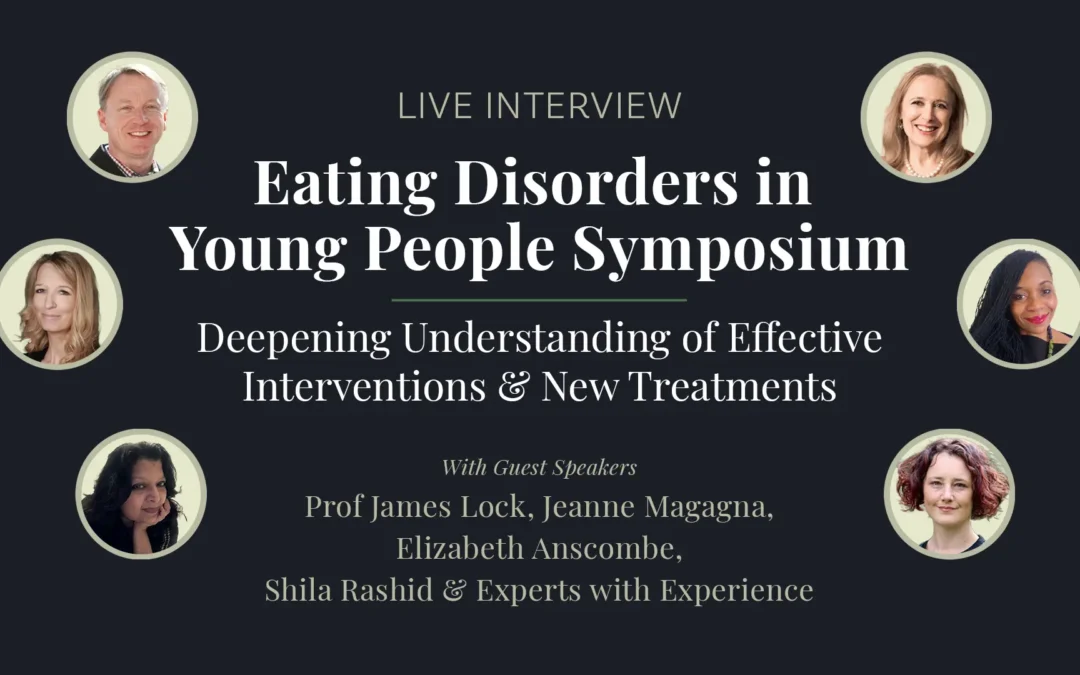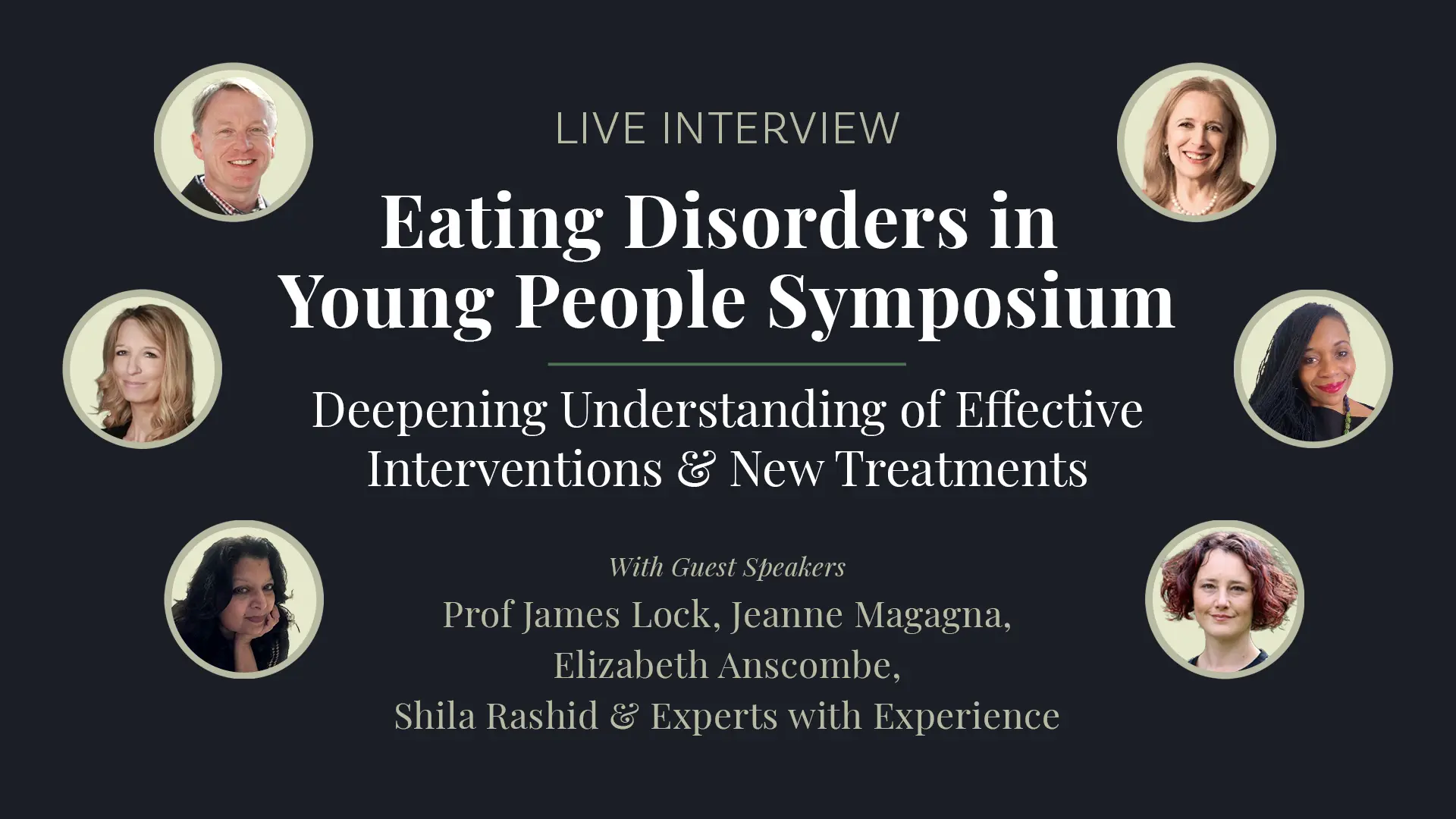– Watch this recording for £39 includes a 3 hour CEU/CPD certificate –
Eating Disorders in Young People Symposium
Deepening Understanding of Effective Interventions & New Advances in Treatment with World Leading Specialists
With Guests Speakers
Prof James Lock, Jeanne Magagna, Elizabeth Anscombe, Shila Rashid & Experts with Experience
“The experts knowledge and experience had me pinned to my seat for the Eating Disorders Symposium. I learnt so much and was very moved by the contributions of the young people and parents. The whole panel inspired hope as well as a lot of learning for me.”
The experts knowledge and experience had me pinned to my seat for the Eating Disorders Symposium. I learnt so much and was very moved by the contributions of the young people and parents. The whole panel inspired hope as well as a lot of learning for me.”
MINDinMIND hosted a panel of global experts dedicated to researching and treating Eating Disorders. The event featured clinicians, parents, and young sharing their clinical wisdom and stories of survival and recovery.
This in-depth discussion focused on what interventions help recovery from anorexia nervosa and bulimia nervosa. Key concerns faced by clinicians dealing with childhood and adolescent eating disorders were explored.
We also explored key psychological theories such as psychoanalytic ideas, systemic thinking and neurobiology that help us bring understanding and insights into these complex conditions.
Chaired by Jane O’Rourke, a Child, Adolescent & Family Psychotherapist and award-winning BBC producer, the discussion covered critical topics, including:
- Early Detection
- Therapeutic Interventions
- Race & Culture influences
- Co-occurring Disorders
- Resistance to Treatment
- Body Image Distortion
- Relapse Prevention
- Societal Influences
- Family Dynamics
- Interdisciplinary Collaboration
- Ethical Dilemmas
- Treatment Accessibility
Recorded: Dec 6 2023
Duration: 2hr 53m
OUR PANEL:
Professor James Lock
James is co-author of the first set of guidelines for treating adolescents with eating disorders. He is a Professor of Child Psychiatry and Pediatrics at Stanford University School of Medicine where he also serves as Director of the Eating Disorder Program for Children and Adolescents. Dr Lock has published over 200 articles, abstracts, and book chapters. He is the co-author of Treatment Manual for Anorexia Nervosa: A Family-Based Approach, Help Your Teenager Beat an Eating Disorder and Treating Bulimia in Adolescents: A Family-Based Approach.
Dr Jeanne Magagna
Jeanne is a psychoanalytic Child Psychotherapist, Family Psychotherapist, Adult Psychotherapist and former head of Psychotherapy Services at Great Ormond Street Hospital for Children, Jeanne has written over 90 books and papers, including the recently published, ‘A Psychotherapeutic Understanding of Eating Disorders based on 36 years of experience working with children and young people with eating disorders and their families.
Elizabeth Anscombe
Liz is a child and adolescent psychotherapist and Lead Psychotherapist at the Royal Free Hospital’s multidisciplinary Adolescent Eating Disorders service, one of the largest CAMHS eating disorder services in the UK..
In her role as lead psychotherapist Liz, offers adolescent-focused treatment for anorexia, plus family therapy for families affected by anorexia and bulimia. Liz is a senior honorary lecturer at the Tavistock Clinic and also lectures and supervises on Eating Disorders and Attachment trauma, at the Anna Freud Centre, the Society of Analytic Psychology, and the British Psychoanalytic Society.
Shila Rashid
Shila is a Systemic Psychotherapist, Supervisor and Trainer. She has worked predominantly in the NHS as a Systemic Psychotherapist for the last twenty-five years, with children, young people, families, couples, and adults, in both community-based and in-patient mental health settings, and, over the latter decade of her time in the NHS specialising in working with eating disorders.
She is Course Lead of the MA in Systemic Psychotherapy at The Tavistock Centre.
Anna Oliver
Anna is a consultant dietitian who brings a broad experience and compassionate skills base to her work with clients. Anna has primarily dedicated her career to nutritional counselling, supervising and teaching in the treatment for eating disorders. She has a private practice in London and serves as the Chair of the London Eating Disorder Dietitians Group.
Anna co-authored the ‘The clinical guidelines for dietitians treating young people with anorexia nervosa – family focused approach’ to support the UK’s National Eating Disorder Team Training.
Abiola Awojobi-Johnson and Emilola Johnson – Experts by Experience
Abiola and daughter Emilola share their personal journeys with eating disorders during their teenage years and share their reflections on the impact of race and culture on eating disorders in girls and women of colour.
Abi collaborates with organizations such as the Anna Freud Centre, Mind, and the Royal College of Psychiatrists.
Alan and Amber Lofthouse – Experts by Experience
Alan and his eldest child Amber share their journey through a protracted struggle with anorexia. Whilst Amber is now recovered, Alan has transformed into a dedicated advocate for other fathers facing similar challenges. He shares insights gained from supporting fellow parents and what he believes are the critical lessons that clinicians must grasp to effectively aid parents whose children are grappling with eating disorders.



